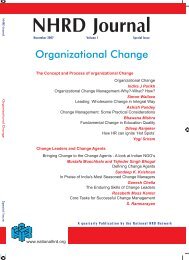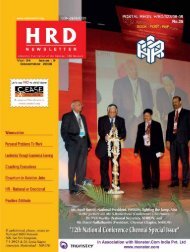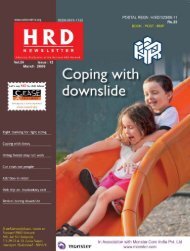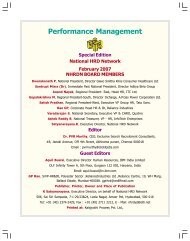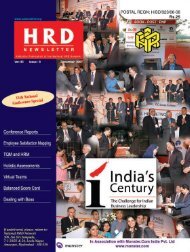New Year Resolutions of a Manager - National HRD Network
New Year Resolutions of a Manager - National HRD Network
New Year Resolutions of a Manager - National HRD Network
Create successful ePaper yourself
Turn your PDF publications into a flip-book with our unique Google optimized e-Paper software.
Spiritual Intelligence<br />
Naachimuthu, K.P, & Rekha, K.N<br />
INTRODUCTION<br />
'To be taught is nothing- everything is<br />
inside waiting to be awakened'<br />
- Paracelsus<br />
Individuals require a wide variety <strong>of</strong> skills,<br />
knowledge or ability to perform a task. It is<br />
generally referred as the "Intelligence".<br />
Although it is hard to define Intelligence, it<br />
can be described as, the individuals' overall<br />
ability to adapt, adjust, learn and carry out<br />
abstract thinking, etc. As more researchers<br />
started focusing on specific aspects <strong>of</strong><br />
intelligence they classified intelligence in to<br />
various types such as Academic / cognitive<br />
intelligence, mechanical / motor intelligence,<br />
emotional intelligence (interpersonal<br />
intelligence & intrapersonal intelligence),<br />
social intelligence, etc. To complement all<br />
the other types <strong>of</strong> intelligence, Spiritual<br />
Intelligence (SI) is classified as another type,<br />
which deals with truly humane aspects and<br />
fills the gap <strong>of</strong> how to make a man, a<br />
complete 'being'.<br />
HUMAN BEING - A MIXTURE OF THREE<br />
ELEMENTS<br />
Human beings are product <strong>of</strong> three elements<br />
viz. Thinking, Feeling and Being. Thinking has<br />
more to do with IQ/ Cognitive Intelligence and<br />
it helps an individual to analyze, adapt to<br />
situations, make wise decisions and act<br />
accordingly. Feeling is more related to<br />
emotions/EQ. It refers to the individuals'<br />
ability to understand the emotions <strong>of</strong> oneself<br />
and others and handling it more effectively.<br />
Though these two (IQ & EQ) are more<br />
focused on external environment, SQ is more<br />
focused on inner development and it helps<br />
in giving individuals how to make a value<br />
addition to it.<br />
Being<br />
Thinking<br />
Human<br />
Being<br />
Feeling (EQ)<br />
SPIRITUAL INTELLIGENCE<br />
The term 'Spiritual' or 'Spirituality' refers to<br />
the subtler element <strong>of</strong> one's inner self. It has<br />
nothing to do with religion. A person is said<br />
to be exercising spirituality, when he or she<br />
is able to see one's own self in others. When<br />
this spirituality is practiced a harmless,<br />
happy and harmonious living community<br />
can be developed in this earth. The term<br />
'Spiritual Intelligence' can be described as<br />
'the intelligence with which we address and<br />
solve problems <strong>of</strong> meaning and value, the<br />
intelligence with which we can place our<br />
actions and our lives in a wider, richer,<br />
meaning-giving context, the intelligence with<br />
which we can assess that one course <strong>of</strong><br />
action or one life- path is more meaningful<br />
than other.' (Danah Zohar & Ian Marshal)<br />
Spiritual Intelligence is a transformative<br />
intelligence that makes an individual whole<br />
and gives him / her ones own integrity<br />
(Zohar, 2000). Spiritual intelligence can be<br />
described as a deep self-awareness in<br />
which one becomes more and more aware<br />
<strong>of</strong> the dimensions <strong>of</strong> self, not simply as a<br />
body, but as a mind-body and spirit. When<br />
we employ our spiritual intelligence, we<br />
reach the extraordinary place in which our<br />
mind no longer produces data <strong>of</strong> the type<br />
wanted or needed and the need for intuition<br />
becomes accelerated. As conscious beings,<br />
we are aware <strong>of</strong> our thought images and<br />
feelings as they arise in our consciousness;<br />
yet our complex and not so complex<br />
processing <strong>of</strong> information in the brain leads<br />
to an inner experience. This inner experience<br />
represents the essence <strong>of</strong> spiritual<br />
intelligence.<br />
QUALITIES OF SPIRITUAL MATURITY:<br />
◆ Love, compassion and service: Love<br />
and compassion are <strong>of</strong>ten associated<br />
with the beginning <strong>of</strong> a true spiritual life.<br />
Love dissolves confusion and fear and<br />
elicits kindness, openness and respect.<br />
Unless we love and trust ourselves, we<br />
cannot love others. Compassion goes<br />
beyond a personal form <strong>of</strong> love to a love<br />
<strong>of</strong> all creation.<br />
◆ Honesty and authenticity: No longer<br />
lying to ourselves and others about what<br />
we are doing and what the<br />
◆<br />
◆<br />
◆<br />
◆<br />
◆<br />
◆<br />
◆<br />
◆<br />
◆<br />
consequences are. To live as we really<br />
are without delusion about the reality <strong>of</strong><br />
the past, the present, our selfhood and<br />
behaviors.<br />
Physical, emotional, mental and<br />
spiritual clarity: Physical clarity has to<br />
do with attention to the body's health<br />
and real needs. Mental and emotional<br />
clarity have to do with awareness,<br />
discernment and lucidity. Spiritual clarity<br />
has to do with wholeness, simplicity and<br />
sensitivity.<br />
Responsibility and discipline:<br />
Becoming accountable for ourselves<br />
without feeling excessively responsible<br />
for others. Dependable and creative<br />
completion <strong>of</strong> our responsibilities and a<br />
disciplined approach to personal growth.<br />
Serenity: A state <strong>of</strong> equanimity, inner<br />
tranquility and peacefulness in the face<br />
<strong>of</strong> challenge and change.<br />
Personal freedom: Letting go <strong>of</strong><br />
attachments and living questions and<br />
problems into answers and<br />
opportunities without drama, escape, or<br />
avoidance.<br />
Tolerance and patience: The ability to<br />
embrace self and 'the other' in spite <strong>of</strong><br />
perceived weakness or difference. To<br />
even move beyond tolerance to<br />
acceptance and celebration <strong>of</strong><br />
difference and diversity. Patience means<br />
to take events and experiences as they<br />
come without complaint or expectation.<br />
It also means all things have a natural<br />
time and place to be.<br />
Faith, trust, and inner security: The<br />
ability to live without anxiety or doubt.<br />
An inner security free <strong>of</strong> fear and<br />
deprivation.<br />
Wisdom and understanding: Deep<br />
insight, possible at any age, expressed<br />
through everyday action.<br />
Gratitude, humility and willingness:<br />
Gratitude is the recognition <strong>of</strong> the little<br />
miracles that occur everyday. Humility<br />
is the ability to move beyond arrogance<br />
and grandiosity toward an honest<br />
acceptance <strong>of</strong> ourselves with all our<br />
perceived limitations and faults.<br />
Hope, happiness, joy, and humor:<br />
Naachimuthu, K.P, Faculty member, Sona School <strong>of</strong> Management, Salem. E-mail : pnachimuthu2005@yahoo.co.in<br />
Rekha, K.N, Academic Associate, Indian School <strong>of</strong> Business, Hyderabad. E-mail : rekhathegreat@gmail.com<br />
| <strong>HRD</strong> <strong>New</strong>s Letter | January 2007, Vol.22, Issue:10 16|







